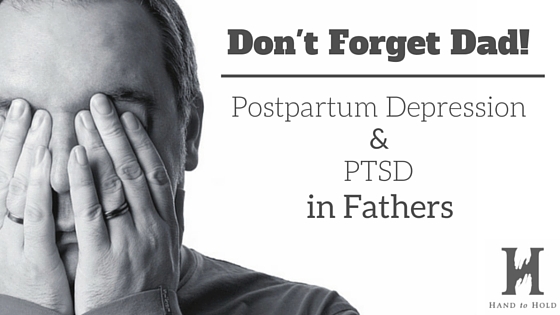This post is the first installment in a three-part series on PPD and PTSD in NICU parents. Visit part 2 of the series: Postpartum Depression after a Complicated Delivery, and part 3: Postpartum PTSD: How to Manage a Traumatic Birth Experience.
We spend a lot of time talking about the postpartum wellbeing of moms. But fathers are half of a parent couple and need attention too!
Dads are, of course, essential as a support for a woman who might be going through postpartum depression or postpartum PTSD (Posttraumatic Stress Disorder). But they can also suffer from these conditions.
How common is postpartum depression in fathers?
Postpartum depression in fathers occurs at a rate of 3-10%, depending on the criteria used to make the diagnosis. This is about a third the rate of postpartum depression in women, which is similar to the overall differences in the rates of depression diagnosis between men and women. This rate is also quite a bit higher than the overall rates of depression in men at other points in their lives, meaning this postpartum period is a time of vulnerability.
One of the strongest predictors of postpartum depression in men is actually postpartum depression in a partner. Other risk factors include a history of depression, certain stressors like jobs and financial problems, lack of a good role model, and relationship conflict. The change in the relationship between the couple, with the father feeling excluded from mother-infant bonding, can also be a trigger.
What are the symptoms of postpartum depression in fathers?
Depression in men can appear differently compared to women. While women often describe a sad or tearful mood, men tend to be more irritable. They can become more isolated and withdrawn, less involved with their families.
Additional symptoms to keep an eye out for include:
- Feelings of worthlessness or guilt
- Changes in appetite
- Recurrent thoughts of death
- Feelings of helplessness or hopelessness
- Restlessness
- Problems with sleep and energy beyond what would be expected for a new parent.
What about postpartum PTSD (Post Traumatic Stress Disorder) in fathers?
Postpartum PTSD in dads has been studied even less than depression. And often these two conditions are closely linked.
There are certain situations that can predispose a man to postpartum PTSD. Research has linked the occurrence of postpartum PTSD with certain traumatic pregnancy events, such as having an infant in the NICU or having a partner going into early labor.
What are the symptoms of postpartum PTSD in fathers?
- After experiencing a trauma, there are three primary types of symptoms:
- Re-experiencing the event; this is often through nightmares or daytime flashbacks
- Avoidance behaviors; this is often avoiding any reminders or triggers of the trauma
- Hyper-arousal; this is often feeling more vigilant or more easily startled or anxious
Why is it important to diagnose and treat these conditions in men?
First, of course, is that it affects the father and his ability to enjoy the postpartum time with his partner and child. Because of stigma and society’s expectations that men be the provider and the caretaker, there is often a hesitation to seek treatment and often times men suffer in silence.
Second is that there are long-lasting effects on the child. A depressed man has difficulty with the day-to-day interactions necessary for parenting a child, and this has long-term consequences. He is less interactive, less engaged, less attentive to his child. Studies have shown that this can increase the risk of a psychiatric diagnosis in the child later in life. Behavioral consequences can be observed in the child as early as 6 months and for many years thereafter. This includes hyperactivity and conduct problems.
Finally, the marriage is affected. There is less harmony and more conflict. In married couples, this increases the risk of divorce. There can also be a higher risk of interpersonal violence.
How can fathers get better from postpartum depression and PTSD?
Treatment is effective! There are many options, both medications and different types of psychotherapy. The first step is recognizing the need for treatment and reaching out to a doctor. It is important to know that sometimes these symptoms can develop several months postpartum, not just immediately afterwards.
Most primary care physicians are quite skilled at treating mental health conditions such as depression and would be able to recommend a medication or a therapist. A pediatrician could also potentially make this type of recommendation. Additional options to consider include couples counseling for the parents or parenting classes, particularly if a prominent stressor is anxiety about the transition to parenthood. And finally, if you have paternity leave time, use it! Longer paternity leave is associated with a more positive attitude towards parenting.
So I hope that with Father’s Day approaching, we begin to pay more attention to the mental wellbeing of dads, and that we continue to be mindful of postpartum depression and PTSD in fathers moving forward.
 About Dr. Glezer
About Dr. Glezer
Dr. Anna Glezer is a Harvard-trained clinician with current joint appointments in the reproductive psychiatry and OB/GYN departments at UCSF Medical Center. She is the founder of Mind Body Pregnancy, a new online educational resource that helps women with their emotional well-being and mental health during pregnancy, delivery, and postpartum.

